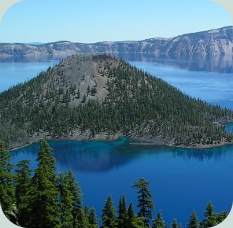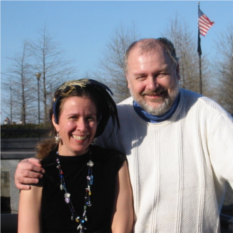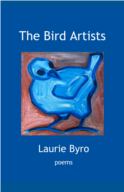Fall 2009
Table of Contents - Vol. V, No. 3
Christopher T. George
Laurie Byro,
The Bird Artists, LaurieByro.com, $10.00 plus $3.00 shipping & handling.
This is a slim book but like the diminutive Laurie Byro herself, it is packed with power. The title poem well exemplifies what Ms. Byro brings to the table as a poet, a vibrant personal perception of the world enlightened by age-old myth and needle-point observation of animal and bird imagery:
When my skin no longer fits, I carry a bag of bones,
to the edge of the ocean. I steal the breath from a gull.
On the beach a mother bends to help a young boy
bundle up a baby cormorant. I watch as they cradle it,
hold a wing into the air and fling it eastward.
I thought you could teach me how to fly. I made you
out of sand dunes and red clay. My husband sleeps.
I conjure up you, Merwin, and you, Merlin.
Palm trees and ancient words, a black cauldron
of seawater and fire. You spread the fan of the cormorant’s
wing and arrange your pigments and brushes, stroke
each feather with woodland brown or green.
I feel my skin begin to loosen. I pick away the lice,
curl back the sclerotic welt of paint.
For the “Bird Artists”, the poet was honored by first place in the March 2007 InterBoard Poetry Competition (IBPC). In her remarks about the poem, judge Pascale Petit, the French/Welsh poet who lives in the UK, said in part: “Every line is weighted with a surprising image or action. Even though the effect is mythic, there’s a precise highly wrought feel to this poem. Not a word or space is wasted. Vulnerable, visceral and ethereal, it lingers in the imagination and draws me back to marvel at its compact power.”
Now here I have to admit some personal bias toward Laurie and her poetry. On a speaking trip several years ago, I made a special stop in Hoboken, New Jersey, to meet Laurie and her husband, Mike, and we were photographed by Mike by the Hudson River. On that occasion, Laurie wore a headdress of feathers, appropriate for a poet who deals so rawly and beautifully with tales of the bird and animal kingdom.
In the following poem, Ms. Byro adapts the story in Charlotte Brontë’s Jane Eyre to make her own piece of memorable literature:
I kept thinking I was Jane Eyre’s daughter.
I suspected my mother really wanted a son.
Fascinated with attics I foraged through chests
with breakable locks filled with baptism gowns,
sniffed among moth-balls for matchboxes
from exotic pool halls, hints of adoption papers.
I kept thinking I was Jane Eyre’s daughter, trying
to find myself in the travel section of the library
searching for a honeymoon in Katmandu.
St John bristled when I wanted our first dance
to be to the tune of Sexual Healing. Every one
broke off the engagement before the tickets’
non-refundable fee kicked in. I kept thinking
I was Jane Eyre’s daughter. Weddings
were unpleasant since I would rush in late,
panting “I object” for the sheer joy of seeing
horrified expressions, maids tearfully ringing
hands and not bells. Today as I left another
thwarted nuptial, four fine blackbirds watched me
from the wires which connected my rubber ball
heart to my deeply anticipated “his”. My mother,
Aunt Reed, dear crazy Bertha, and daddy
in his mourning coat: the grim four posed perfectly
still like chessmen while I crossed my bosom
which throbbed like the July sun and waited
with little patience for mother to play her next card.
And here we’ll look at one more poem that illustrates Ms. Byro’s adept use of animal and nature imagery and the mesmerising way she interweaves myth and reality to create something fresh and memorable:
I wasn’t sure what he wanted of me; the ice
in winter birches had made the forest slouch
into spring. All that winter I peeled
and sucked papery bark for the sweet taste.
I recognized him from his red tongue,
the furtive runs when I entered his dream
and we crawled along the forest floor, repenting
the dark. I had nothing to bargain with,
no deal to make him human. The night
was filled with briars and salt. In the summer
the air became thick with honeysuckle, slick
with mating. Beetles droned in messy beds
of clover. We slunk along, weeds stroking
my belly. I hadn’t yet decided which life
was better. Grass combed the plume of my tail.
The nights were crystal sharp. I waggled
my slit high, what was left of my breasts pushed
into a pile of decaying leaves. Who cared
how many and how often, I was not entirely his.
Eyes of owls glittered in the sleep of trees, tree frogs
sang in a green-robed choir. The moon clamped
its yellow tooth into my shoulder. I took the whole
night inside. What was to become of us? I had
packed away my white Juliet cap and veil for just
such an occasion. I held him like a warm
peach in my palm, longed for his juice to run
down my chin. Most nights I didn’t care about
the names they gave me. I held my fingers
out to him, felt the tug as my ring fell off, carried
my limbs down to the entrance of his den,
planted a birch just outside his home
as a token of my loyalty. I was free
of the chains of consequence. I gave birth
to his amber-eyed bastard who without hesitation
he devoured. When he becomes old and says
he always dreams of me, I shall make myself
a meal of him, savor his voluptuous tongue,
and suck all the bitterness from his bones.
He will not make such promises again.
Laurie Byro’s voice is a unique one. It’s no wonder that she consistently garners recognition in the monthly IBPC awards. She deserves even greater attention in the poetry world at large. May it come about.
© Christopher T. George


